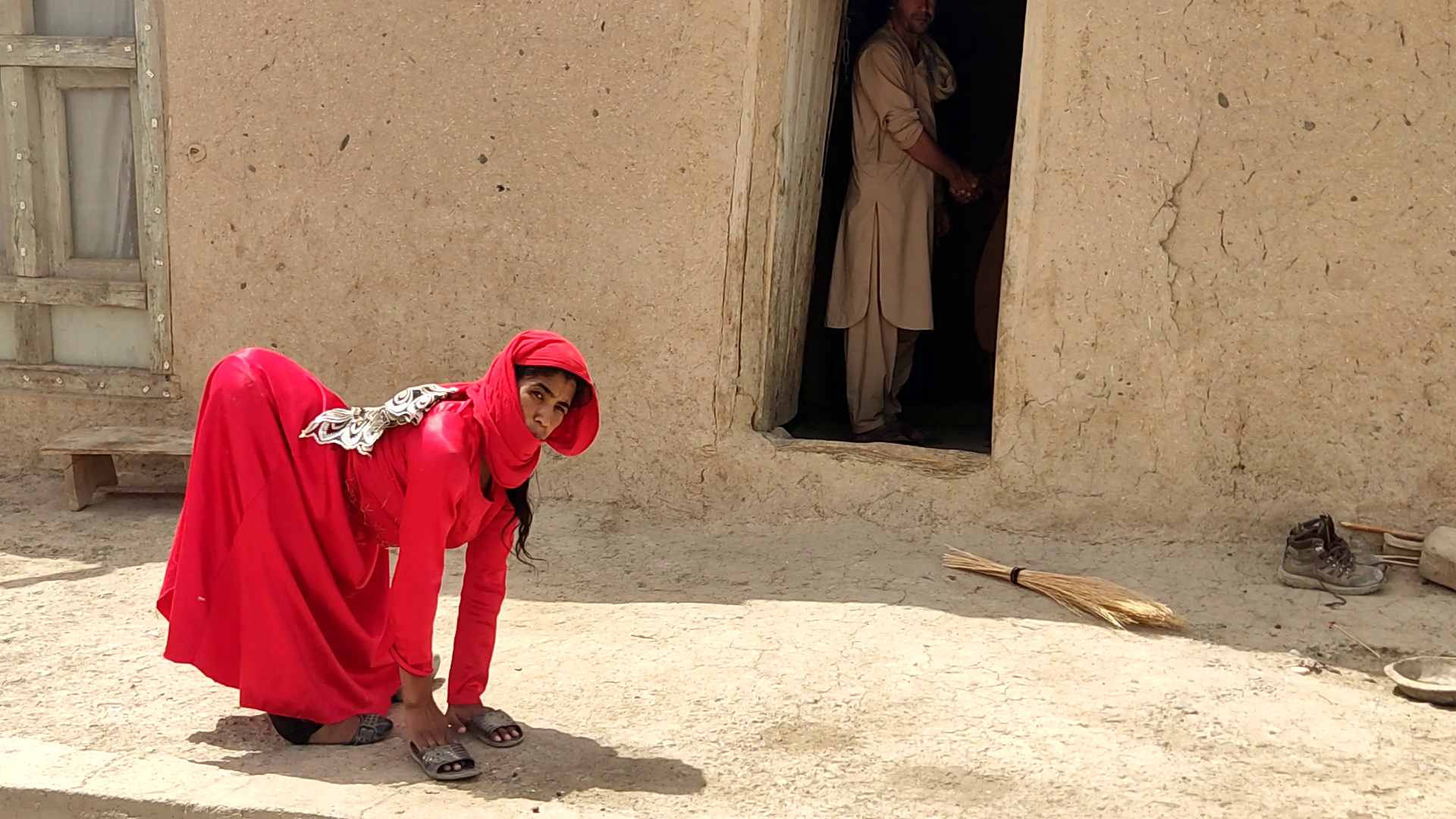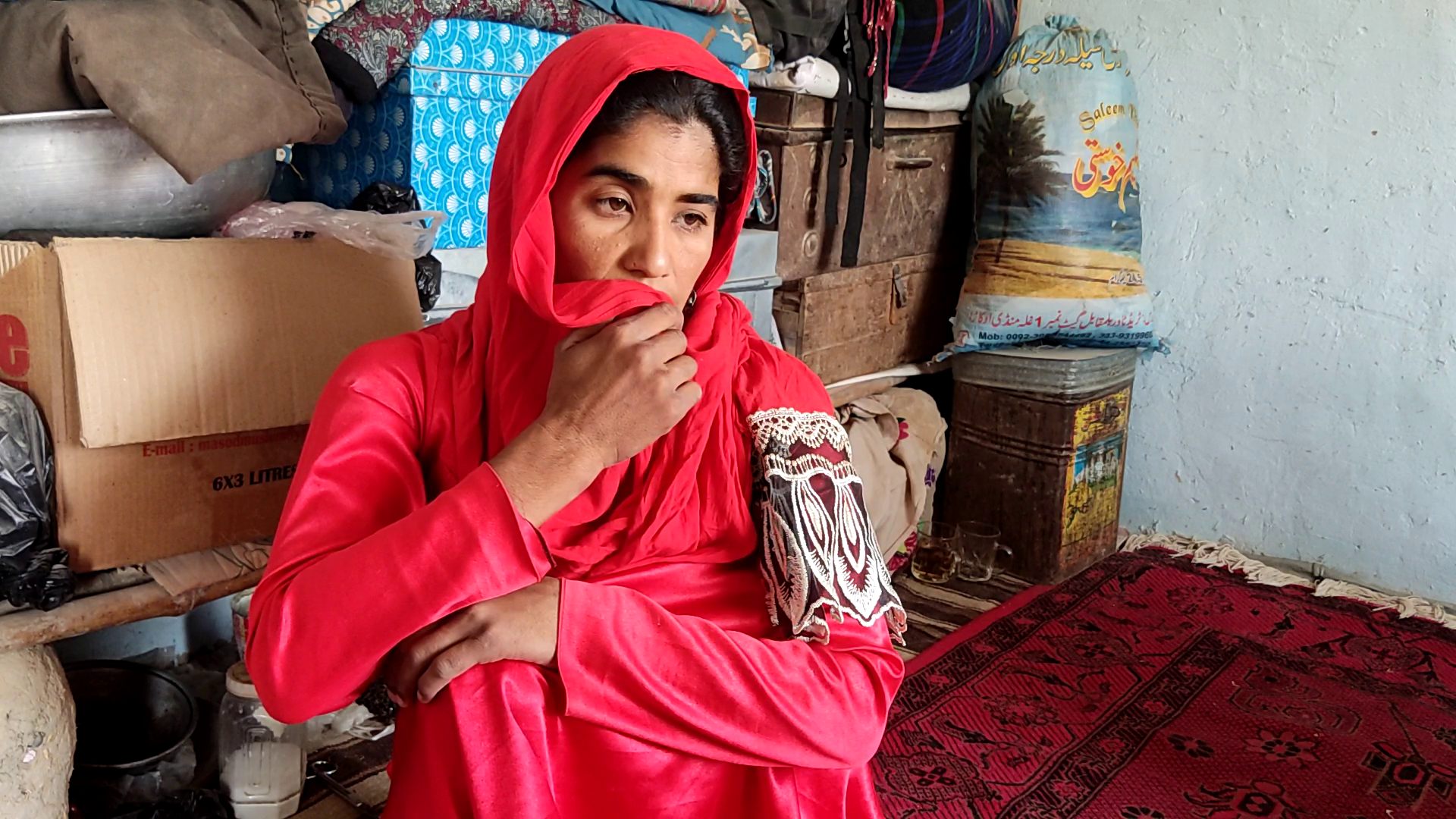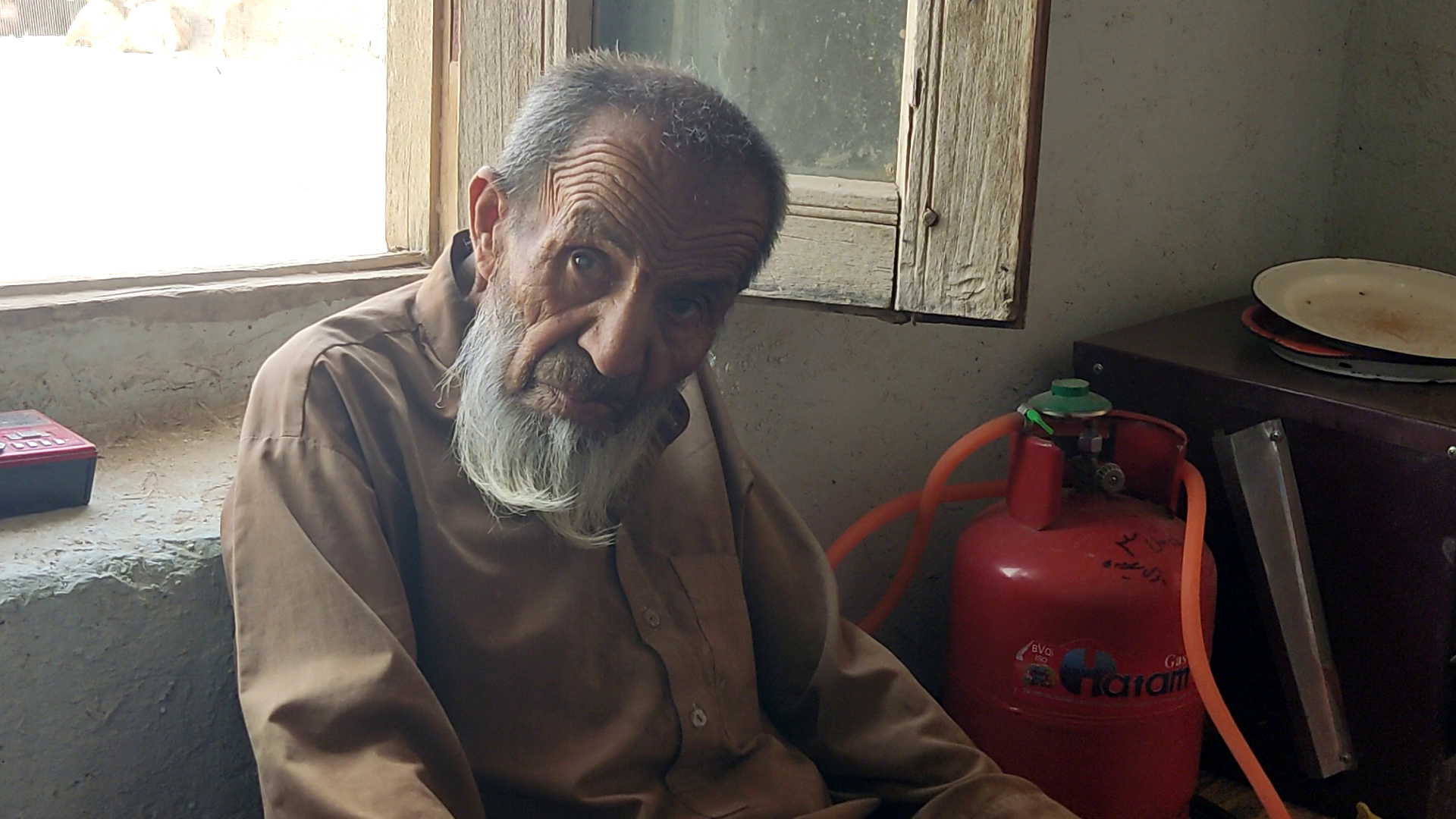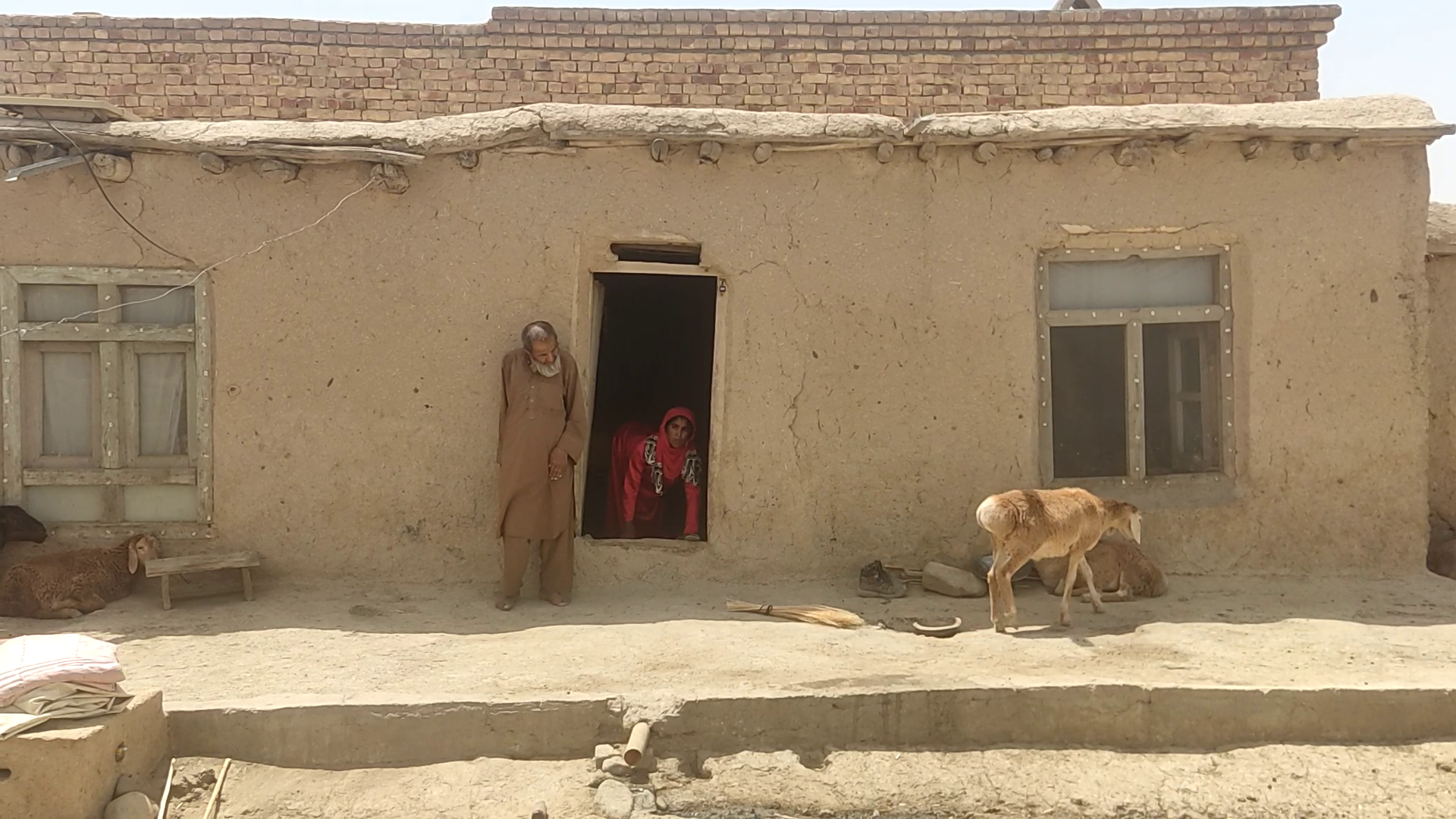Her Greatest Dream, to Walk
Anisa is a 26 year-old Afghan woman paralyzed from the waist down due to her family’s disbelief in vaccines. She uses her hands to walk around the house.

Written by Muqaddas Mubariz
NAHRIN, BAGHLAN — “‘It’s better if she dies than living this life, what’s it worth anyways?’ I overheard female neighbors say while talking about me, making me extremely sad,” 26 year-old Anisa, told Alive in Afghanistan. Anisa is paralyzed below the waist and moves around by using her hands as feet.
Family's disbelief in polio vaccination; a girl who became paralyzed Walking; the biggest wish of a girl who has fallen victim to polio Anisa is a young girl in Baghlan province who, in her childhood, became a victim of this disease due to her family's disbelief in polio vaccination, and she has been paralyzed from the waist down. She now lives with her 80-year-old father in poor economic and emotional conditions, while she has nothing to eat.
Lack of awareness and disbelief in families about the polio disease, the ongoing wars preventing vaccines and vaccinators from reaching remote areas, the impassable roads, and the economic weakness of people to treat their patients in relatively standard hospitals in city centers have been considered reasons for the paralysis of a number of children due to polio in recent years.
In this report, Muqaddas Mubariz portrays the situation of a young girl who has fallen victim to polio in Nahrain District, northeast of Baghlan Province.
NAHRIN, BAGHLAN — Anisa uses her hands to walk around after becoming paralyzed from the waist down due to her family’s disbelief in vaccines. Video by: Muqaddas Mubariz
On a warm and sunny day, I've mentally prepared myself to report on the situation and a day in the life of a paralyzed young girl. Our destination is the village of Darra Gi in Nahrain District of Baghlan Province, and I leave the car, a white Suzuki Swift, at Polkhmari to head to Anisa's home. Anisa has been living alongside her frail and helpless father in a paralyzed state for over 20 years.
The route to Anisa's home is winding and filled with steep slopes and non-standard roads. The taxi driver opens up about the problems faced by the villagers in the area when he realizes that I'm a reporter here to document the life of a disabled girl. "The roads are non-standard, there's no water, domestic violence is prevalent, and the youth are fleeing..."
As I pass by the old mud houses, I am captivated by their large wooden gates that have probably nurtured generations. Perhaps one of these houses is Anisa's home.
The motorbike's tires are still spinning as my phone rings. Anisa is calling to provide me with a more precise address. She says, "Come a little further down another alley." The driver, who has some familiarity with the area, continues on the path.

In the middle of the village, children of various heights are running toward a flowing water channel, laughing as they escape the heat and cool off. The scene reminds me of my own childhood, when I used to play with healthy girls of the same age. I'm still lost in my childhood memories when the driver says, "Get out, we've reached our destination."
I knock on Anisa's large wooden gate, and a faint voice from a girl says, "Come inside!" As the gate opens, my eyes fall on a girl in red attire standing next to the wall, bent at the waist. She has khaki shoes on both hands to protect them from harm when she crawls.
As she moves, she places her hands on the ground and, with legs that have been immobile for many years, she makes a difficult journey from one place to another. With hazel eyes and a smile sealed on her lips, she gazes deeply at me, conveying an emotion as if a cure for her condition has arrived.
I enter her small room to delve deeper into the story of her paralysis and adventurous life.
Anisa, 26 years ago, opened her eyes to the world in a small family in Darragi, Nahrain District of Baghlan Province. Her mother died in childbirth when Anisa was only four years old.
"I don't know when we were hit by this disease. I was four years old when my mother died during childbirth. When her baby was born, my mother passed away, and she stayed with my grandmother for forty days before she, too, died. At that time, my father was a school student. Currently, my father is 80 years old and is under a lot of pressure. He cannot walk or work, and our living conditions are very dire. We've sold everything we had to buy food, and now nothing is left."

They used to have some goats and sheep, and by selling the animal dung, they managed to sustain their life for some ten years. However, for the past decade, her father has lost the ability to care for their property, and now they barely make ends meet by selling their only four chickens. Occasionally, their neighbors provide them with dinner and breakfast.
In Anisa's eyes, one can see her worried life. Her despondent looks make it clear that she has been indebted to life for a lifetime. According to Anisa, her disability has taken not only her legs but also her ability to attend school and study. She wishes she had healthy legs to become a doctor and serve people. She expresses, "I wish God had given me healthy legs so that I could serve others."
She is paralyzed from the waist down and struggles to perform household chores. She says that when she needs to use the bathroom, she cannot easily carry the water bucket to the bathroom due to her inability to walk.
"Every morning, I sweep the house, and if I have the patience, I sweep the courtyard. If not, I leave it as it is. In the bathroom area, if there's water, I take a bath; if not, I sit on the floor with one hand holding a water bucket handle, and I move the bucket forward while moving myself behind it to reach the bathroom."
Anisa, a girl whose life has taken an unexpected turn from her childhood dreams, says, "A person's wishes never end until they die. If I weren't paralyzed, I would have liked to get married and have a family."
Anisa attributes the reason for her paralysis to her family's disbelief in polio vaccination, economic difficulties, and lack of proper protection during her childhood.
No efforts have been made to treat her, and she says that due to her economic difficulties, she has not been taken to more experienced doctors outside of Baghlan such as those in Kabul. "At that time, doctors in Baghlan said it was polio and needed to be taken to Kabul for treatment. They never took me to Kabul. They only took me to a religious scholar in Andarab District once for treatment, but it was in vain."
Anisa expresses her struggles with the immobility of her legs, economic difficulties, and the hurtful behavior of others, which brings tears to anyone's eyes: "Neighbors used to say it would be better if I died rather than live this way. What's the point? I heard their words and was deeply affected. Instead of uplifting a patient's spirit, their poisonous words break it."
Her biggest regret in life is the inability to move her legs. She says that if her legs could move, she would study and attend school like other girls.

"Economic difficulties are very hard on people. My step-sisters do some things for me, but when I ask for help from my father's relatives, they say, 'Let her die, what good is she?' Nobody helps."
When a reporter or YouTuber comes to reflect on her condition and her way of life, she feels a sense of happiness that maybe someone will hear her voice, and an angel of salvation will come to her aid, the happiness that has not sweetened her life and has not given her the ability to walk.
She says that her treatment is possible inside and outside the country, but economic difficulties have not provided her with the opportunity for improvement. She asks merchants and charitable organizations to help and collaborate with her so she can achieve her biggest wish, "walking with her own legs."
The lack of awareness among families and their disbelief in polio vaccination, the inability to deliver this vaccine in conflict-affected areas, as well as poverty and hardship, have caused some children, especially in remote areas, not to be vaccinated. This has left some of them permanently separated from the joys of life, immobile, and dependent on others.
Polio, also known as Infantile Paralysis, currently exists only in two countries in the world, Afghanistan and Pakistan. Unfortunately, the disease has not been completely eradicated. Although the polio vaccine is administered to children under five in most parts of the country, the latest case was reported in Nangarhar Province this year.
